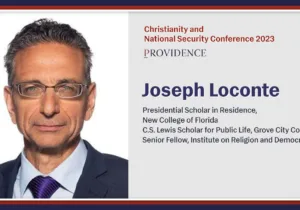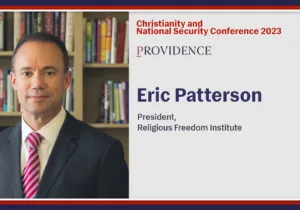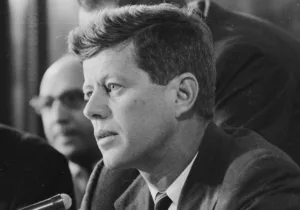Visiting historic, charming Lexington, Virginia is a tonic for the soul, and among its ornaments is the General George Marshall Museum and Library, honoring the soldier and statesman who attended Virginia Military Institute, whose campus the museum adjoins. Today I noticed a wonderful painting there that the General personally commissioned in 1945. Based on a favorite photo of Marshall’s, it shows WWI American soldiers, specifically army ambulance crews, inside a church in Vaux, France. One plays the organ, while others sing, and still others solemnly listen. It’s one week before the November 11, 1918 armistice, and they have stopped briefly for respite before heading north to Sedan. The organist is playing the hymn “Brighten the Corner Where You Are,” whose lyrics are:
Do not wait until some deed of greatness you may do,
Do not wait to shed your light afar;
To the many duties ever near you now be true,
Brighten the corner where you are.
Marshall commissioned the painting to counter impressions that American soldiers were all about “drinking and carousing.” Having served in France in WWI as chief of staff to American commander General Pershing, Marshall recalled another reality, which evidently he thought pertinent to American soldiers also in WWII, when he was U.S. Army Chief of Staff.
Dutifully self-effacing, Marshall didn’t advertise himself and had no political ambitions. He was almost universally trusted, except during the early Cold War when some McCarthyites absurdly tried to paint him as soft on communism. Churchill called him the “organizer of victory,” and Truman said he was “the greatest military man America ever produced.” As possibly his greatest admirer, Truman made him Secretary of Defense and State. FDR said he could not sleep at night if Marshall were not in Washington available for counsel.
Of course, Marshall was mortal and made mistakes, urging a premature Allied cross-channel invasion of France, and initially opposing the North Africa campaign, which maybe why FDR appointed Ike and not Marshall to command the eventual invasion, besides his concerns about sleeping at night. Marshall had dreamt of the appointment but refused to seek it, although he stewed afterwards by doing an extensive overseas tour. He also opposed Truman’s quick recognition of Israel, fearing impact on USA relations with Arab nations, advice that Truman unusually and fortunately rejected. Whatever the disappointments, he never shirked duty. Marshall was in character and temperament similar to Washington and Lee, whose examples must have been instructive while Marshall studied in Lexington, home of Washington-Lee University.
Marshall was a quiet Christian, who attended army chapels as an example for his troops. Carefully nonpartisan, he didn’t even vote, avoided obsequiously laughing at FDR’s jokes, expected the President to call him General and not George, and explained that his mother was Republican, his father Democrat, while he was Episcopalian.
Discovering, mentoring and managing the great American commanders of WWII and beyond, Marshall uncomplainingly ceded credit to them while content, when allowed, to retire to his small Virginia estate, where he enjoyed gardening and the simple pleasures of spreading manure, again replicating the example of Washington. The hymn sung by the soldiers in the scene he cherished undoubtedly spoke to Marshall:
Do not wait until some deed of greatness you may do,
Do not wait to shed your light afar;
To the many duties ever near you now be true,
Brighten the corner where you are.
Marshall brightened many corners in war and peace, most exceptionally the Marshall Plan to economically revive nearly war ruined Europe, generating 70 years of peace and prosperity, for which he won the Nobel Peace Prize. Persons of Marshall’s talent and character are unusual, especially in our own age. But today as I was repeatedly greeted on the campus of Virginia Military Institute by brisk young cadets exclaiming “how are you, sir” and “good evening sir,” I wondered if one or more of them could be a future General Marshall rescuing us from crises to come. God knows.







 Sponsor a student for Christianity & National Security 2024
Sponsor a student for Christianity & National Security 2024